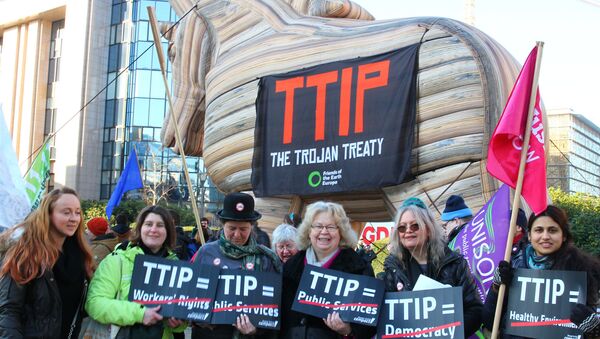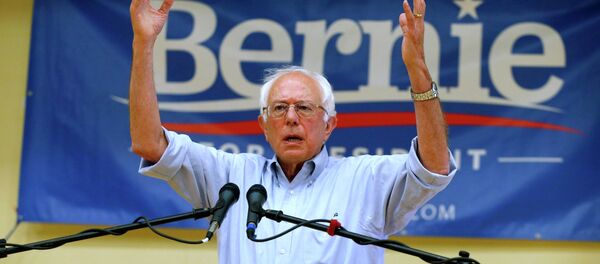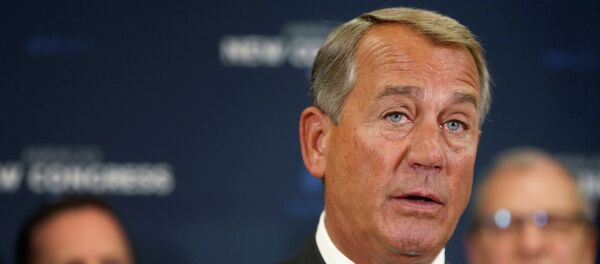On Monday, US and European negotiators began the 13th round of talks on the Transatlantic Trade and Investment Partnership, or TTIP, in New York. The increasingly unpopular and unusually secretive trade deal is expected to address issues including agricultural markets, government procurement practices, regulatory cooperation, and energy exports.
The proposed deal faces widespread condemnation in Europe and the United States, with opponents on the left arguing that it will diminish wages, worker protections, and environmental quality, while opponents on the right fear that the deal will give an unelected body power to manipulate the economic policies of signatory countries.
In the United States, opposition to trade deals has been a leading theme of the current presidential election cycle. Popular insurgent Democrat Bernie Sanders and Republican frontrunner Donald Trump have both excoriated job-destroying trade pacts including NAFTA and CAFTA, while warning that the Trans-Pacific Partnership (TPP) and TTIP are the kind of deals that destroyed the country’s middle class, only much more draconian. The most likely presidential successor, Hillary Clinton, claims that she opposes these trade deals, despite previously effusively supporting trade pacts.
The risk of a Sanders or Trump presidency, or the danger that their perspectives may impact Clinton if she wins, has led President Obama to ratchet up the pace in negotiations for the TTIP and TPP. Some commentators wonder if presidential politics may color the opinion of Congress, which ultimately must approve the deal unless it can be passed through procedural loopholes without a proper vote in the waning hours of a lame-duck session in November.
By contrast, the opinion of the electorate has no impact on Obama’s European counterparts, with the deal being negotiated on and approved by the unelected European trade commission.
With the specter of officials cramming yet another unpopular trade pact down the throats of citizens in America and Europe, Loud & Clear’s Brian Becker sat down on Wednesday with John Hilary, a vocal opponent to the trade pact and the executive director of War on Want.
What is the TTIP?
"The TTIP is this massive transatlantic trade deal being negotiated by the EU and the USA," said Hilary. "It is aimed at covering all of the aspects of our commercial relationship – trade, investment, and setting up operations in each other’s countries."
"The reason why it is being done in secrecy is that if people know what is being traded away here then there will be absolute outrage," explained Hilary. "We already have seen huge demonstrations across Europe and I think we increasingly seeing anger in the United States about what people are seeing is inside TTIP because TTIP is not your traditional trade deal."
The pundit explained that, unlike recent 20th century trade deals that primarily codified commodity trading, TTIP is about getting rid of regulations on environment, worker protection, food safety and wages. "What they are trying to trade away in New York are all of these standards that we think are so important but that big business wants to see disappear," said Hilary.
Why has the TTIP taken so long to negotiate?
When the TTIP was initially floated years ago, EU and US officials expected that the trade agreement would be finalized by the end of 2014 but now analysts suggest that, if it happens at all, a finalized deal may not come forward until 2019 or 2020.
Hilary stated that the primary force driving opposition to the deal is the European and American public. He referenced, for example, what he called "one of the most contentious elements" of the trade pact – the establishment of investment courts where corporations can sue governments if their future profits are harmed – that was so unpopular that it stopped talks altogether for a year and a half.
The commentator took heart in the fact that there have been repeated delays in negotiating the TTIP, as well as the TPP in Asia. "The longer they take, the more people get to hear about what is actually in TTIP and the more they hear, the more outraged they are that our governments could even conceive doing such a dirty deal."





